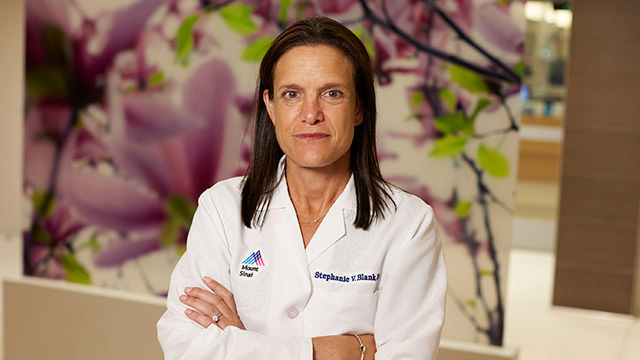
Women’s Cancer Program
You are beautiful. You are strong. You can do this.
We understand how difficult it is to receive a diagnosis of breast or gynecologic cancer and how it can affect your emotional well-being, your physical health, and your family.
That’s why we created the Women’s Cancer Program at the The Blavatnik Family Chelsea Medical Center at Mount Sinai, not only to treat your cancer but also to care for all aspects of your health. We work to make your diagnosis and treatment process as easy as possible. Located in the airy and calm environment of The Blavatnik Family Chelsea Medical Center at Mount Sinai, our program is focused on you, and our doctors specialize in understanding not only what is happening with your cancer, but also the joys and challenges of the rest of your life.
We are committed to moving quickly to use the latest and most effective science to treat you. But first, we listen to you—your questions, your fears, your needs. We give you expert advice about the best cancer treatment available, and with your personalized treatment plan, we act together as a team to heal you. You are always the most important player on your own health care team. We are committed to empowering you throughout your journey. Together, we design the most personalized plan that targets the specific type of cancer you have.
We offer a wide range of services for people who have—or might have—breast, endometrial, ovarian, vaginal, cervical, and uterine cancer, or who are at increased genetic risk for these cancers. We provide the full range of preventative, diagnostic and treatment options, including surgery. In addition, our patients have access to:
- Genetic testing and counseling
- Hereditary gynecologic cancer surveillance and prevention program
- Sexual health
- Menopause medicine
- Oncofertility services
- Support services
- Surveillance Program for women at high risk for breast cancer
We believe in a team approach. Your team consists of your doctors, your nurses, our administrators, nutritionists, genetic counselors and all of the support services you need. Your team is on this journey with you 100 percent. To us you are so much more than a patient, and we work toward the positive completion of your treatment.
All in One Place
The Mount Sinai Women’s Cancer Program has everything you need all in one place. We can diagnose and treat you as you move through your journey with cancer here at the Chelsea facility. Our warm, individualized outpatient care takes place within this hidden neighborhood gem, home to dedicated women’s cancer doctors: gynecologic oncologists, breast specialists, medical oncologists, infusion therapists, and radiation oncologists. You will find your doctors and services are on the same floor, connected and easy to reach.
Because we are part of the Mount Sinai Health System, the Mount Sinai Women’s Cancer Program connects you to several of our New York City hospitals for any inpatient procedures you may require. Your doctor is also your connection to clinical trials, some conducted through the research arm of our medical school, the Icahn School of Medicine at Mount Sinai. We bring the latest innovations in treatment to you at the Blavatnik Center.
Using the most advanced genetic testing supported by our genetic counselors, you may choose to learn if you and your family members may be genetically at risk for cancer. We can help you understand and make lifestyle choices that may improve your long-term health. In some instances, we may suggest regular monitoring of your health with screenings or advise on ways to prevent cancer.
The treatment we provide depends on the type of cancer you have. Our goal is to increase your treatment options and maintain your quality of life. We make sure that you get the best treatment available, and we support you in addressing other needs that may arise. Our professional support service providers, along with your doctors, help you understand your diagnosis, prepare for treatment, find comfort during treatment, and fully experience the survivorship phase of your journey. Our groups and support service activities welcome your family and friends as well.
Conditions We Treat
We know how important it is to get answers—and quickly—when facing a cancer diagnosis. The Mount Sinai Women’s Cancer Program doctors will see you as soon as possible. Please visit us whether you have a diagnosis of one of the cancers listed below, or if you have received concerning results from a screening. We also welcome you for a second opinion; many second-opinion patients stay with us for the compassionate, personalized care we provide.
Gynecological cancers we treat include:
- Cervical
- Ovarian
- Uterine or endometrial
- Vaginal
- Vulvar
- Fallopian tube
- Primary peritoneal
We also treat noncancerous gynecological conditions including:
- Genetic predisposition to gynecologic cancer
- Pelvic masses
- Cervical dysplasia
- Endometrial hyperplasia
- Endometriosis
- Ovarian cysts
- Pelvic pain and related conditions
- Uterine fibroids
Breast conditions we treat include:
- Breast cancer
- Noncancerous breast conditions
- Benign breast masses
- Breast infections
- Breast pain
- Enlarged lymph nodes (axillary lymphadenopathy)
- Gynecomastia
- Lumps
- Nipple discharge
- Lesions
- Thickening of the breast
Diagnostics and Treatments
We perform on-site diagnostic screening and tests for women who may have breast or gynecologic cancer, using the latest technologies, such as:
- Breast imaging/radiology
- 3D breast tomosynthesis
- Mammography
- Molecular imaging
- Ultrasound
- Image-guided breast biopsy
- Transvaginal ultrasound
- Positron emissions tomography (PET)
- Computed tomography (CT)
We provide outpatient care on-site, including:
- Breast surgery – minor procedures
- Dilation and curettage (D&C)
- Genetic counseling
- Infusion therapy
- Medical oncology, including chemotherapy and hormonal therapy
- Nutritional counseling
- Psychiatry radiation oncology
- Social work

















